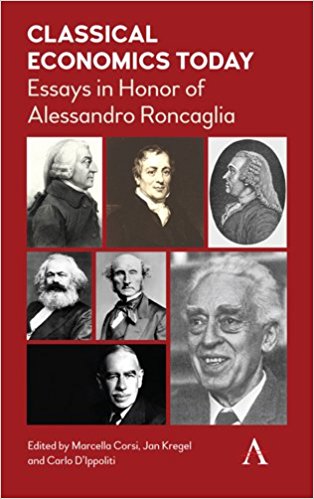Director of Research Jan Kregel is one of the editors and contributors for a new collection of essays devoted to the work of Alessandro Roncaglia: Classical Economics Today: Essays in Honor of Alessandro Roncaglia is a collection of essays that pays tribute to Alessandro Roncaglia whose research is based on Schumpeter’s dictum that good economics must encompass history, economic theory and statistics, and therefore does not generally take the form of elegant formal models that are applicable to all and everything. In this direction, Roncaglia is inspired by the Classical economists of the past and becomes a model for present-day Classical economists. A perceptible family air imbues the essays: all the contributors are friends of Roncaglia and see his personality and his interests as
Topics:
Michael Stephens considers the following as important: book, Books, Classical economics, Jan Kregel, Roncaglia
This could be interesting, too:
Robert Skidelsky writes A Tale of Frankenstein – Lecture at Bard College
Robert Skidelsky writes In Memory of David P. Calleo – Bologna Conference
Robert Skidelsky writes Keen On Podcast: Episode 2229: Robert Skidelsky worries about the Human Condition in the Age of Artificial Intelligence
Michael Hudson writes Temples of Enterprise
Director of Research Jan Kregel is one of the editors and contributors for a new collection of essays devoted to the work of Alessandro Roncaglia:
Classical Economics Today: Essays in Honor of Alessandro Roncaglia is a collection of essays that pays tribute to Alessandro Roncaglia whose research is based on Schumpeter’s dictum that good economics must encompass history, economic theory and statistics, and therefore does not generally take the form of elegant formal models that are applicable to all and everything. In this direction, Roncaglia is inspired by the Classical economists of the past and becomes a model for present-day Classical economists. A perceptible family air imbues the essays: all the contributors are friends of Roncaglia and see his personality and his interests as a common point of reference.
View the table of contents below the fold:
The Reconstruction of an Alternative Economic Thought: Some Premises, Salvatore Biasco;
Reflections on Unity and Diversity, the Market and Economic Policy, Jan Kregel;
Ending Laissez-Faire Finance, Mario Tonveronachi;
Democracy in Crisis: So What’s New?, Michele Salvati;
The Democracy of Ideas: J. S. Mill, Liberalism and the Economic Debate, Marcella Corsi and Carlo D’Ippoliti;
Turgot and the Division of Labor, Peter Groenewegen;
Agricultural Surplus and the Means of Production, Gianni Vaggi;
The Role of Sraffa Prices in Post-Keynesian Pricing Theory, Geoffrey Harcourt;
Classical Underconsumption Theories Reassessed, Cosimo Perrotta;
On the “Photograph” Interpretation of Piero Sraffa’s Production Equations: A View from the Sraffa Archive, Heinz D. Kurz and Neri Salvadori;
On the Earliest Formulations of Sraffa’s Equations, Nerio Naldi;
Normal and Degenerate Solutions of the Walras- Morishima Model, Bertram Schefold;
Trading in the “Devil’s Metal”: Keynes’s Speculation and Investment in Tin (1921–46), Maria Cristina Marcuzzo and Annalisa Rosselli;
The Oil Question, the Prices of Production and a Metaphor, Sergio Parrinello;
Europe and Italy: Expansionary Austerity and Expansionary Precariousness, Davide Antonioli and Paolo Pini;
Adam Smith and the Neophysiocrats: War of Ideas in Spain (1800–4), Alfonso Sánchez Hormigo

